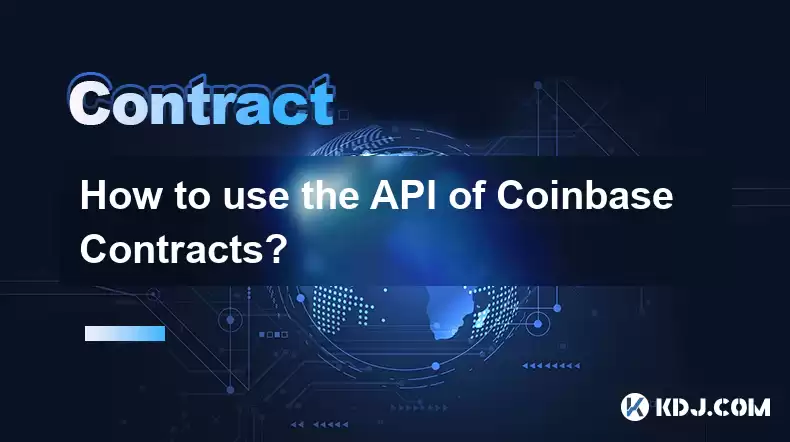-
 bitcoin
bitcoin $87959.907984 USD
1.34% -
 ethereum
ethereum $2920.497338 USD
3.04% -
 tether
tether $0.999775 USD
0.00% -
 xrp
xrp $2.237324 USD
8.12% -
 bnb
bnb $860.243768 USD
0.90% -
 solana
solana $138.089498 USD
5.43% -
 usd-coin
usd-coin $0.999807 USD
0.01% -
 tron
tron $0.272801 USD
-1.53% -
 dogecoin
dogecoin $0.150904 USD
2.96% -
 cardano
cardano $0.421635 USD
1.97% -
 hyperliquid
hyperliquid $32.152445 USD
2.23% -
 bitcoin-cash
bitcoin-cash $533.301069 USD
-1.94% -
 chainlink
chainlink $12.953417 USD
2.68% -
 unus-sed-leo
unus-sed-leo $9.535951 USD
0.73% -
 zcash
zcash $521.483386 USD
-2.87%
How to use the API of Coinbase Contracts?
Coinbase Contracts data access is indirect, typically via third-party APIs requiring authentication and careful key management; rate limits and robust error handling are crucial for successful integration.
Mar 18, 2025 at 04:55 pm

- Coinbase Contracts API offers programmatic access to trading data and functionalities.
- Authentication is crucial and uses API keys with varying permission levels.
- Understanding the API endpoints is vital for effective interaction.
- Rate limits exist to prevent abuse; exceeding them leads to temporary bans.
- Error handling is essential for robust application development.
- Security best practices are paramount to protect API keys and user data.
Coinbase Contracts, while not directly offering a consumer-facing API in the same way as its exchange counterpart, provides access to market data and potentially trading functionality through its underlying infrastructure. This indirect access is typically leveraged by professional traders and developers building algorithmic trading bots or data analysis tools. Understanding how this access is achieved, however, requires a nuanced understanding of the landscape. Directly interacting with Coinbase's Contracts API requires a high degree of technical proficiency and often involves third-party providers or indirect methods.
Accessing Coinbase Contracts Data:There isn't a publicly documented, direct API for Coinbase Contracts in the same way as the Coinbase Pro exchange API. Information regarding contracts trading is often disseminated through websocket feeds or accessed through specialized data providers who aggregate information from various sources, including Coinbase. These providers often offer APIs to access this aggregated data. This means accessing contract data often involves using a third-party service and their respective API documentation.
Authentication and API Keys:Accessing any data, even through a third-party provider, will almost certainly require authentication. If working directly with Coinbase (which is less common for contracts), this would involve generating API keys with appropriate permissions. These keys should be treated with extreme care, stored securely, and never hardcoded directly into your application. Always use environment variables or secure configuration mechanisms. Third-party APIs will have their own authentication methods, often involving API keys or OAuth 2.0.
Understanding API Endpoints:The specific endpoints will depend entirely on the third-party data provider or any internal APIs offered by Coinbase (if any). These endpoints define the specific requests you can make to retrieve data. Common endpoints might include fetching current market prices, historical trade data, order book information, or even submitting trade orders (though this last aspect is less common with publicly accessible APIs for contracts). Thorough documentation from your data provider is essential.
Rate Limits and Error Handling:All APIs have rate limits – restrictions on the number of requests you can make within a specific time frame. Exceeding these limits can lead to temporary blocks or account suspension. Your application must be designed to handle these limits gracefully, potentially using techniques like queuing or exponential backoff. Robust error handling is equally important. Your application should gracefully handle network errors, API errors, and unexpected data formats.
Security Best Practices:Security is paramount when working with any API, especially those involving financial transactions. Never expose your API keys in your code or commit them to version control systems like Git. Use HTTPS for all communications. Regularly review and update your API keys, rotating them periodically to mitigate the risk of compromise. Implement input validation to protect against common vulnerabilities like SQL injection or cross-site scripting (XSS).
Common Questions:Q: Is there a public Coinbase Contracts API?A: No, there isn't a publicly documented, direct API like the one for Coinbase Pro. Access is often indirect, via third-party data providers or through less-publicly-available channels.
Q: How can I get real-time data for Coinbase Contracts?A: Real-time data is usually obtained through websocket connections provided by third-party data providers, not directly from Coinbase. These providers aggregate and reformat data from various sources.
Q: Can I place trades programmatically on Coinbase Contracts?A: Direct programmatic trading on Coinbase Contracts through a publicly available API is unlikely. Third-party providers might offer this functionality, but it's often subject to limitations and requires significant expertise.
Q: What kind of data can I access via third-party APIs?A: Third-party APIs typically provide market data like current prices, order books, historical trade data, and potentially indicators derived from this data. The specific data available depends entirely on the provider.
Q: What programming languages are compatible with these APIs?A: Most third-party providers support common languages like Python, JavaScript, and others. The specific compatibility depends on the API's documentation and the libraries available.
Q: Are there any specific libraries or SDKs available?A: Since there's no official Coinbase Contracts API, dedicated SDKs are rare. Third-party providers might offer client libraries, but it’s often necessary to work with standard HTTP requests libraries.
Q: What are the costs associated with using these APIs?A: Costs vary significantly depending on the data provider and the level of access. Some might offer free tiers with limited access, while others charge based on data usage or API calls. Always review the provider's pricing structure.
Disclaimer:info@kdj.com
The information provided is not trading advice. kdj.com does not assume any responsibility for any investments made based on the information provided in this article. Cryptocurrencies are highly volatile and it is highly recommended that you invest with caution after thorough research!
If you believe that the content used on this website infringes your copyright, please contact us immediately (info@kdj.com) and we will delete it promptly.
- SEC's Capital Haircut for Stablecoins: A Game Changer for Wall Street and Digital Finance
- 2026-02-22 18:45:01
- Q4 2025: Institutional Bitcoin ETF Exposure Digs In Amid Market Volatility
- 2026-02-22 18:45:01
- Bithumb's Phantom Billions: Ghost Coin Scandal Haunts Market Share, Deepens Regulatory Scrutiny
- 2026-02-22 15:50:01
- Google AI Unveils Breakthroughs in LLM Accuracy and Inference Costs with Gemini 3.1 Pro and Deep-Thinking Ratio
- 2026-02-22 15:50:01
- Tiger Research Unpacks the AI Agent, Crypto Giants Conundrum: Innovation, Integration, and the Shadow of Speculation
- 2026-02-22 15:45:01
- A Child's Play Ends in Tragedy: The 'Girl, Choking, Ludo Coin' Incident
- 2026-02-22 13:05:01
Related knowledge

How to use "Smart Dom" or "Heatmaps" for scalping? (Professional tools)
Feb 21,2026 at 11:20pm
Understanding Smart DOM Mechanics1. Smart DOM displays real-time order book depth with dynamic color gradients indicating aggressive buyer and seller ...

How to trade "GameFi" token futures during new releases? (Narrative)
Feb 14,2026 at 11:39pm
Understanding GameFi Token Futures Mechanics1. GameFi token futures are standardized derivative contracts that derive value from underlying tokens tie...

How to trade "Stablecoin" de-pegging using futures? (Black swan hedge)
Feb 20,2026 at 11:19pm
Understanding Stablecoin De-Pegging Events1. Stablecoins are designed to maintain a fixed value relative to a reference asset, most commonly the US do...

How to avoid "Emotional Trading" after a big futures loss? (Trading mindset)
Feb 17,2026 at 01:40pm
Understanding Emotional Trading Triggers1. A sharp equity drawdown in leveraged futures positions often activates the brain’s threat response, mimicki...

How to trade "Fan Tokens" using perpetual contracts? (Sporting events)
Feb 20,2026 at 07:39am
Understanding Fan Tokens in Perpetual Contract Markets1. Fan tokens are utility tokens issued by sports clubs, leagues, or federations to deepen fan e...

How to use "On-Chain Signals" for futures entry confirmation? (Data-driven)
Feb 16,2026 at 08:59am
Understanding On-Chain Signals in Futures Context1. On-chain signals refer to quantifiable metrics derived directly from blockchain transaction data, ...

How to use "Smart Dom" or "Heatmaps" for scalping? (Professional tools)
Feb 21,2026 at 11:20pm
Understanding Smart DOM Mechanics1. Smart DOM displays real-time order book depth with dynamic color gradients indicating aggressive buyer and seller ...

How to trade "GameFi" token futures during new releases? (Narrative)
Feb 14,2026 at 11:39pm
Understanding GameFi Token Futures Mechanics1. GameFi token futures are standardized derivative contracts that derive value from underlying tokens tie...

How to trade "Stablecoin" de-pegging using futures? (Black swan hedge)
Feb 20,2026 at 11:19pm
Understanding Stablecoin De-Pegging Events1. Stablecoins are designed to maintain a fixed value relative to a reference asset, most commonly the US do...

How to avoid "Emotional Trading" after a big futures loss? (Trading mindset)
Feb 17,2026 at 01:40pm
Understanding Emotional Trading Triggers1. A sharp equity drawdown in leveraged futures positions often activates the brain’s threat response, mimicki...

How to trade "Fan Tokens" using perpetual contracts? (Sporting events)
Feb 20,2026 at 07:39am
Understanding Fan Tokens in Perpetual Contract Markets1. Fan tokens are utility tokens issued by sports clubs, leagues, or federations to deepen fan e...

How to use "On-Chain Signals" for futures entry confirmation? (Data-driven)
Feb 16,2026 at 08:59am
Understanding On-Chain Signals in Futures Context1. On-chain signals refer to quantifiable metrics derived directly from blockchain transaction data, ...
See all articles

























![[Ripple Forecast] Trump's son + BlackRock simultaneously buy 200 billion XRP! The era of automatic deposit of 5 million won in annual interest with 500 XRP is coming? [Ripple Forecast] Trump's son + BlackRock simultaneously buy 200 billion XRP! The era of automatic deposit of 5 million won in annual interest with 500 XRP is coming?](/uploads/2026/02/22/cryptocurrencies-news/videos/origin_699a2b3d69d82_image_500_375.webp)















































